- Home
- Liz Braswell
Unbirthday Page 2
Unbirthday Read online
Page 2
“Oh, look, it’s the famous English girl come to take photographs of the poor but pretty foreign children.”
Alice spun around, affronted by both the words and tone. A young man not much older than herself leaned lazily on a worn statue of a cannon and gave her an indecipherable smile. His clothes were very different from the rest of the crowd here: they were adult, for one thing, pressed and clean and grey and professional. His jacket was spotless, his waistcoat well fitting. He didn’t have a watch, but his purple cravat looked expensive and silken. His hat was carefully brushed. Under it was red hair so dark it was nearly black, trimmed very neatly around his ears and neck. His eyes were a light hazel that was nearly orange. His cheeks glowed a healthy shade of rose.
“Tell me,” he continued, reaching down to pet a stray cat that quickly disappeared around the corner, “do your patrons enjoy weeping crocodile tears over portraits of the other half, and how they live?”
“I beg your pardon,” Alice replied coldly, straightening her spine—until it cracked. “These photographs are for my personal use, and the occasional private viewing with my aunt to a select and discreet crowd. I am not some sort of terrible charity vampire preying on the sorrowful state of others.”
“Oh? And how much do you know about their sorrowful state? How much do you know about them at all?” he pressed.
Alice regarded him coolly for a moment.
“That girl over there, in the jacket with the large bone button. Her name is Adina. She is from a shtetl too far from St. Petersburg to be safe from the pogroms. Her mother is dead; her father and her aunt Silvy are her only family in the world.” She gestured at another child. “That’s Sasha. He is probably five years old and prefers cheese to sweets. His mother sews piecework and his father collects rags for the paper companies and his sister is dying of tuberculosis, although he doesn’t really understand that yet.
“I never speak to them patronizingly and I never bribe them to pose with coins or candy. If I bring anything it is enough for all of them and it is just because it pleases me to give. I treat even the littlest one with the same kindness and respect I expect out of everyone.” She said the last bit pointedly, glaring at the stranger.
“All right, all right.” The young man laughed easily. “I apologize. I accused you without knowing whereof I spoke. I was a cad and a scoundrel.”
He gave a bow, and it wasn’t ironic at all.
“You are forgiven,” Alice said, polite but still distant. “May I know whom I have the—pleasure—of addressing?”
“Katz,” he said, taking his hat off. “Abraham Joseph Katz, Esquire. Barrister at Alexandros and Ivy. But you can call me Katz. At your service.”
“I’m—” she began to introduce herself.
“Oh, everyone knows Alice and her camera around here,” the man said, waving his hand. “The one and only Alice. But seriously, you have to understand, these children—even those of us who have grown up here—have not had the greatest experience with your fellow countrymen. Either it’s spit and sneers, or cold charity and exploitation. There’s rarely a middle ground.”
“Us? You sound—you look—” Alice faltered, wondering if she was being rude. “British.”
“I was born here. My parents were not,” he said with a shrug. “They worked hard and I studied hard. Now I help out when I can with a little pro bono work. Sometimes someone with legal power needs to step in and save a child from the poorhouse or a parent from jail. Or worse. Sometimes a patron—say, with a camera—takes a child they fancy away entirely. For display, or ostensibly for charity, or for…things best not spoken of.”
“That’s dreadful,” Alice said with feeling. “I am deeply, deeply sorry for all of it. All the same you can’t blame me for the actions of a few of my terrible countrymen. That would be just like me treating you all poorly because of one bad apple that came in from Russia.”
“A perfectly fair point,” he agreed immediately. “In that case, I offer my stunning visage in case you ever decide you want to come back and take a portrait of me. I am an adult and a child of immigrants—and can legally agree to fair usage of my likeness, should it come to that.”
There was nothing untoward in his tone. He did not wink at her or enunciate any word suggestively. He smiled and it was innocent; he did not even tilt his head dramatically as if posing. Alice felt neither flirted with nor threatened.
It was a little strange.
“Your English is better than that of many of my ‘country-men,’” she said slowly while she tried to work out what that meant. “My neighbors, at least.”
What on earth was she talking about? Was that rude? He had grown up here—he’d just said that! Of course he could speak English perfectly well!
“Ah, well: barrister, remember? I know Latin as well as Russian and English. Quo usque tandem and all that. I should probably learn French, however, so I can at least pronounce the wines.”
Alice felt the world spin a bit like she was tumbling down a rabbit hole. What a strange man to meet in such a strange way! Normally she either avoided the young men pushed on her by her sister, or quickly forgot the ones she somehow met herself. Most were dull and unlikely to be found in this forgotten square. They all made unamusing and lewd jokes and references to Roman scholars they thought she wouldn’t get.
She never had a desire to take a picture of any of them.
Unlike Mr. Katz.
“I didn’t bring enough film today,” she lied. But she did have lots of film already exposed at Aunt Vivian’s waiting to process. Really, that’s what she should have been doing instead of spending the day adventuring. “I was just realizing that when you approached me.”
“Oh, I was joking about the picture. It’s just that I have nothing besides my handsome good looks to offer you, to make up for my insults. I should keep a packet of sweets on me at all times. Remember that—always keep a candy around for emergencies. Someday it may save your life.
“Or, if you have any rats around your house, I could get them for you. I have a friend who is an expert at it.”
“That won’t be necessary,” Alice said quickly. “I’m fairly certain our gardens are rat-free.”
“I don’t know. Rats are pretty sneaky. Sometimes they even make it into elected positions. Sometimes if you let them get out of control they even become mayor.”
Alice couldn’t repress a smile at that, and it almost became a snicker. He was very obviously referring to Ramsbottom, the candidate her sister and the boring Mr. Headstrewth so fervently supported. There was only one other person running, and for the life of her Alice couldn’t remember his name (he was quite forgettable since he had no party affiliation and didn’t write letters to the Kexford Weekly about building workhouses for the poor, kicking out foreigners, and giving the police bigger clubs).
“Well, I should be off, then,” Alice said, putting her camera firmly back in her satchel and closing it up.
“Come back soon,” Katz pleaded. “You’re the most interesting person I’ve talked to in ages.”
Not you’re a bright light in a dark corner of the world, not a fair face in a gloomy neighborhood, not a muse or a nymph or an angel with a rosy smile to bestow on her willing supplicants. None of that nonsense verbiage men usually offered her. He asked her to return, very simply, because he wanted to talk to her.
Alice curtsied, because it was always good to curtsy while you were thinking of a reply, then hurried off, unable to think of one.
She found herself walking quickly away from Wellington Square—more quickly than before, and far more quickly than was strictly necessary. She forced herself to slow to a more ladylike stroll and concentrated on adjusting her breathing (not that hard with a corset already restricting her deepest breaths). Her cheeks felt warm and were probably a beautiful rosy shade.
It wasn’t entirely a lie. She really was heading straight to Aunt Vivian’s now to develop her pictures.
She remembered herself enough to cr
oss to the other side of the street so she could peep into the window of Willard’s Finest Haberdashery. His sign had gold letters and silver flourishes and the hats in his window were stacked artfully on top of each other like a carnival act, complete with fancy plumes and ribbons and spangles. It was delightful—and also felt somehow familiar. In fact, Alice had made friends with Mr. Willard because he reminded her a bit of someone she once knew in a dream, someone she couldn’t quite remember.
When he shared a cup of tea with Alice, the cups matched, they sat quietly, and he discussed the advantages of an economic system in which the common people controlled the means of production—or at least regulated it—and medical care and legal help were free to all. Also advanced schooling and university would be provided gratis.
While this was a trifle boring, it was also quite mad, and his hair was white and wild. He and her aunt had hit it off splendidly—not romantically, but they were bosom companions at once and he became a fixture at her salons.
Today he wasn’t at his worktable but standing outside his shop, eyes closed and face turned up to the sun like a flower, enjoying its rays.
“How do you do, Mr. Willard?” she asked, curtsying. He opened his eyes and smiled at her, his cheeks crinkling into a thousand happy lines.
“Oh, my dear, I am just enjoying this day. The sun is still free for everyone—never forget that. We can all enjoy its life-giving warmth as much as we want.”
“Absolutely true, Mr. Willard. As is the clear blue sky.”
“Quite right, my girl! Say—did you develop that portrait you took of me? Not that I’m vain or anything—all right, perhaps I am. A silly old man indeed! But I would dearly like to see it and show it to my friend Mrs. Alexandros. She is fascinated by photography but not perhaps as brave as you to take it up as a hobby.”
“Why, I’m just on my way to Aunt Vivian’s right now, Mr. Willard. I shall have it developed directly.”
“Oh, excellent. And say hello to your aunt, would you? Tell her I have a hat I think she will absolutely love. Also a pamphlet concerning scientific principles that may prove once and for all that alloparenting—the act of a non-parent helping to raise a child, a niece or a nephew, say—is not just normal, but in fact integral to our evolution as a higher species! Not everyone need have a litter of kittens to be part of the great human cycle, I mean.”
“Alloparenting. Kittens. Yes. I shall, Mr. Willard. Good day!” Alice said, curtsying again.
“Good day, Alice!”
She strolled happily down the road filled to a surfeit with the bonhomie of the moment, the sun, and a day full of the possibility of everything. Of course there was also that young man she had just met…. He certainly added a certain sense of wonder and potential to the air.
She forgot herself, pondering this, and cut through the market: sometimes a place for wonderfully interesting photographs and sometimes a bore, full of gossips who had very strong feelings about Alice and her prospects. She started to duck and hunch over before she caught herself.
“Alice,” she told herself in a patient but chastising tone, “you are eighteen years now, fully grown and an adult, and you can no longer be ordered around or bullied by other adults. Please behave as such.”
She took a deep breath, thanked herself for the reminder, and straightened up, proceeding past the stalls of cabbages with her head high in the air.
“ALICE!”
She slumped.
“Hello, Mrs. Pogysdunhow,” she said as politely as she could. “Good morning, Mrs. Pogysdunhow.”
The short and red-faced woman (Piggysdunhow, as Alice used to call her to Dinah) pushed her way over to talk. She looked exactly the same as when Alice had been of the age to run away from her at first sight: flat grey hair pulled back under an old-fashioned bonnet, dark old-fashioned dress with nary a crinoline or fancy stocking. Despite being the mistress of the rather respectable house up the street from Alice’s family, she dressed and spent like a skinflint from a previous century—and screamed like a tavern matron from a previous millennium. Despite this, or possibly because of it, Alice’s parents had occasionally employed her to look after Alice and her sister when they were younger. Her food was terrible and her breath worse. Somehow she was also always with babies, either children or grandchildren or other young, innocent, and heretofore harmless members of her extended family.
“ALICE, HOW IS YOUR MOTHER?”
She had a baby under her left arm right then, rather like a ball, tucked and restrained despite its desperate squirms in the name of freedom.
“She is fine, Mrs. Pogysdunhow. Thank you.”
“DID SHE GET OVER THAT BIT OF GOUT SHE WAS EXPERIENCING?”
“Er, yes, Mrs. Pogysdunhow. She’s quite well now, thank you.”
“COMES FROM TOO MUCH MEAT, YOU KNOW,” the older woman offered confidentially, which meant lowering her voice to mere half-scream volume. “IT’S ALWAYS WISE TO TEMPER A ROAST WITH A FEW DAYS OF PORRIDGE OR HASH AFTERWARD. A GOOD TURNIP HASH WILL CLEAR IT STRAIGHT UP!”
Alice tried very hard not to shudder.
“That seems reasonable, Mrs. Pogysdunhow. Excellent advice. But if you’ll excuse me, I’m on my way to see my aunt now, and to develop the portraits I took last week. Including the one of you.”
The other woman shook her head. “OH, YOUR AUNT. WELL THERE’S A BLACK SHEEP IN EVERY FLOCK AND THERE’S A PLACE FOR BLACK WOOL IN EVERY SHAWL, I SUPPOSE. GIVE YOUR MOTHER MY REGARDS—AND YOUR FATHER MY SYMPATHY.”
“Yes, Mrs. Pogysdunhow. I shall.”
Relieved almost to the point of fainting at such an easy escape, Alice tried not to rush away. While their relationship had improved somewhat since Alice had the dowager sit—with several babies—for a portrait, she was still mostly an unpleasant, cabbagey woman whose habits had involved making young Alice and Mathilda read long, archaic passages about the importance of…well, things Alice couldn’t even remember. She shuddered at the memory of endless hours of endless sentences in books that made no sense.
And which probably cost the good woman no cents, Alice added thoughtfully, knowing well her tightness.
Down the hill now, she entered the more bohemian section of town, a poor area with pockets of strangely upbeat residents. Some were truly penniless philosophers who would rather read than eat; some were artists who spent every last coin on supplies and refused all patronage. Some were of semi-aristocratic descent, enjoying the decadent atmosphere around their artistic friends (and sometimes even actively contributing). Aunt Vivian was one of the latter.
She had a whole building to herself instead of just a flat, perhaps in slightly better shape than those around it. Alice rang the bell and let herself in; the door was never locked. She immediately began to cough. Besides all the usual apparatus of an artistic lifestyle (half-silvered mirrors, enough silk fringe draped everywhere to curtain a small theater, great and terrible paintings hung on every square inch of wall, etc.) her aunt was a big believer in incense. There were braziers everywhere, and blue smoke hung heavily in every room like a scratchy wool canopy. Alice gulped several mouthfuls of air through her fingers, trying to get used to it before her aunt appeared.
“Alice.”
Her aunt strode in from the hallway with her usual drama and even clapped her hands. She wore soft trousers that came down to her calves, exposing a pair of shiny, chic boots. A thick tunic of velvet made for a shirt, and this was protected with a small apron. She also wore a small pair of gold-rimmed glasses and had her light brown hair back in a bun, which meant she was sculpting.
The two women embraced, and her aunt gave her a very Continental kiss on each cheek.
“You have a bit of a backlog in the darkroom,” the older woman said a little accusingly as Alice carefully took off her hat and removed her satchel. “We shall have to work together, overtime, to get everything developed. It’s a good thing I ordered all those compounds from the chemist—I knew we would be doing heaps….”
Alice wasn�
��t really listening. She was looking at the various portraits around the room she had seen a thousand times: farmers, actors, politicians, laborers, midwives, a princess, boys, girls, babies, all in rich and luscious tones. Photography captured someone exactly as he or she really was, but left out the color in the cheeks. If she were to take a portrait of Katz, it wouldn’t capture him completely unless she used some pink pastel on his face afterward. And some gold for his eyes.
“Hello? Alice? Where are you?” Vivian demanded, narrowing her own pale grey eyes. She shook a finger at her niece. “You are not here. You are entirely elsewhere. What are you thinking about?”
“Oh, the difference between the arts of photography and painting….”
Her aunt regarded her silently.
“I just met someone, that’s all,” Alice finally admitted, waiting for her face to flush, but it didn’t.
“A boy?”
“A young man. A barrister. He was with the children at the Square. He helps out the families there sometimes. His parents were immigrants, too.”
“Oh. A Jewish boy. Your parents are going to love that,” Vivian said with a wicked grin. She grabbed Alice’s hand and pulled her farther into the house, into the basement where the darkroom was.
“No, it’s not like that….”
“No talk. No lies. Just work. Work and art!”
Vivian took a burning joss stick from a brass holder as she went by and waved it before her as if clearing the air.
After putting on (bigger) pinnies, the two women were nearly silent for the next hour. The darkroom was tiny and smelled of fresh chemicals and magic. Well-practiced in what needed to be done, each worked as if she knew the other’s movements beforehand: Pour this solution into that pan. Dip the dry plate in it. Dip the plate in the stop bath. Carefully set out to dry. Repeat.
Most of the ones they were working on were Alice’s (although a few of the photographs were her aunt’s, one a particularly detailed large-format re-creation of The Death of Socrates). She couldn’t wait to take a look at them under real light; in the dim glow of the lantern with the red filter, she could barely see anything even when she tilted them back and forth and squinted.

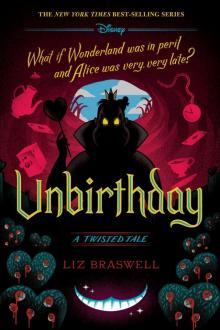 Unbirthday
Unbirthday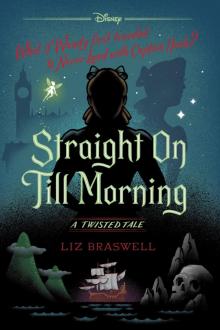 Straight On Till Morning
Straight On Till Morning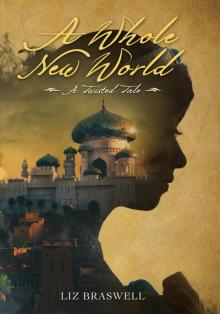 A Whole New World
A Whole New World Once Upon a Dream
Once Upon a Dream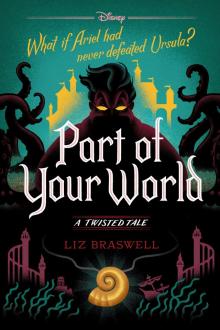 Part of Your World
Part of Your World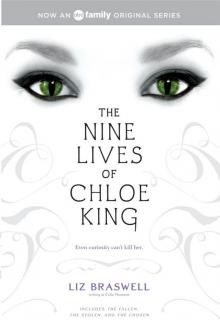 Nine Lives of Chloe King
Nine Lives of Chloe King The Fallen
The Fallen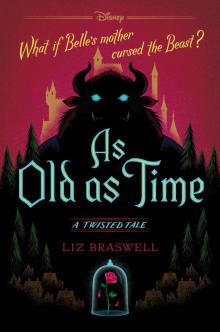 As Old As Time: A Twisted Tale (Twisted Tale, A)
As Old As Time: A Twisted Tale (Twisted Tale, A)